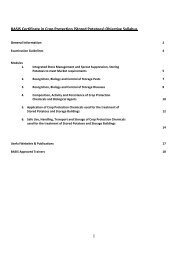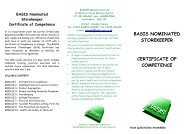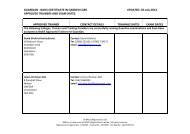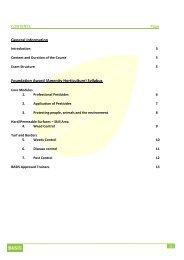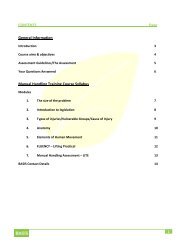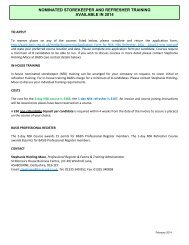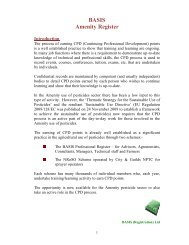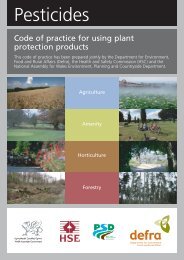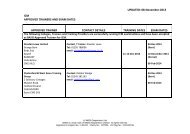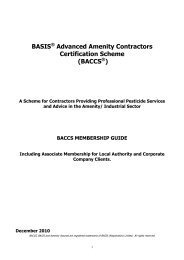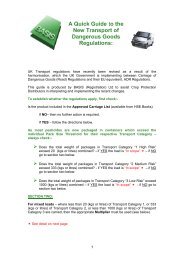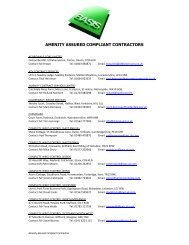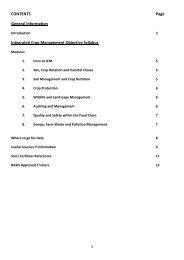FACTS Northern Ireland - Basis
FACTS Northern Ireland - Basis
FACTS Northern Ireland - Basis
You also want an ePaper? Increase the reach of your titles
YUMPU automatically turns print PDFs into web optimized ePapers that Google loves.
YOUR QUESTIONS ANSWERED<br />
• DO I NEED TO TAKE A TRAINING COURSE IN ORDER TO SIT THE <strong>FACTS</strong> EXAMINATION<br />
Not necessarily, if you have enough technical knowledge and in-field experience already. However,<br />
candidates should ensure that they have been trained satisfactorily, either in-house or externally, and<br />
have had sufficient supervised field experience prior to entering for the examination. Following the<br />
introduction of the new NVZ regulations candidates should be able to understand and explain the new<br />
rules and will be examined in both written and verbal examination. They should have read and<br />
understood NVZ Guidance Leaflet No. 1 and Section 1 of RB209 (Principles of nutrient management and<br />
fertiliser use) before presenting themselves for the course and exam. It is important that, where<br />
necessary, the candidate should prepare in this way for the course - the course alone is unlikely to raise<br />
a candidate from minimal knowledge of nutrient use and relevant regulations to success in the exam. If<br />
they do not know these regulations they will not pass.<br />
• WHAT IS THE STANDARD OF THE COURSE<br />
The overall aim of the course is that at the end of training, coupled with previous practical experience,<br />
candidates will have a basic understanding of fertilisers and plant nutrition to enable them to give<br />
advice to farmers and growers which is both economically and environmentally sound. The emphasis<br />
will be on practical knowledge applicable when advising farmers and growers.<br />
• WHAT FORM DO THE TRAINING COURSES TAKE<br />
Normally a one-week residential block (at least 5 days) with an assessment on completion of the<br />
course. Day release or short blocks may be offered, depending on regional requirements.<br />
• WHERE ARE TRAINING COURSES HELD<br />
At selected training centres within the United Kingdom and also at other venues, both in the UK and<br />
abroad, organised by local training groups; a list of current Approved Trainers can be found on page 35.<br />
• HOW DO I APPLY TO TAKE A TRAINING COURSE<br />
Contact the Approved Trainer of your choice. Complete a training course application form and send it<br />
to the centre.<br />
• IS IT POSSIBLE TO USE CORRESPONDENCE COURSES OR EVENING CLASSES<br />
Not currently.<br />
• WHEN AND WHERE ARE EXAMINATIONS HELD<br />
They are currently held at each of the centres listed at the end of this book. Examinations are held<br />
when there are sufficient numbers to make them viable.<br />
• HOW DO I APPLY TO SIT THE EXAMINATION<br />
Complete an examination application form and return it to the centre of your choice. You will be<br />
notified when an examination is to take place. (Those attending a training course will automatically be<br />
entered for the examination and so do not need to apply separately.)<br />
• IF I FAIL THE EXAMINATION, CAN I RE-SIT<br />
Yes you can re-sit the exam; however, BASIS examinations are accredited on the Higher Education<br />
qualifications framework. One consequence of this is that we need to ensure procedures are in place<br />
to improve candidates’ chances of success in subsequent examinations following a previous failure.<br />
Where candidates have been examined unsuccessfully on two occasions, they will be required to<br />
retrain before attempting the exam for a third time.<br />
Candidates and trainers will be required to complete a form to confirm that they have retrained,<br />
particularly covering areas that were identified as ‘areas of weakness’ at previous exams.<br />
10



